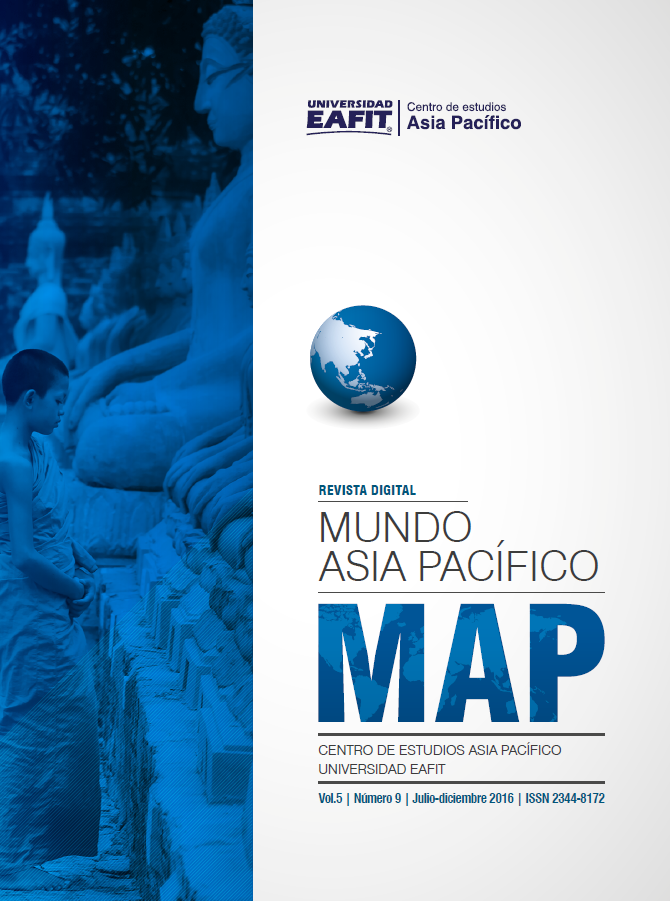Implicaciones culturales y socioeconómicas de la mujer como partícipe en el desarrollo y fortalecimiento de los sectores económicos: un análisis comparativo México-China
Main Article Content
Keywords
China, México, mujer, emprendedoras, innovación, equidad de género
Resumen
El emprendimiento empresarial se presenta como una corriente de vanguardia en los estudios y análisis contemporáneos alrededor de las metas de innovación, crecimiento económico y desarrollo social. La mujer como partícipe de la economía, se ha convertido en un tema de investigación, debido a las implicaciones que su activa vinculación con los sectores de economía formal dentro de las naciones. Por ello, el estudio de empoderamiento del género femenino como parte de las tendencias de emprendimiento empresarial ha sido motivo de reflexión a nivel mundial. En el presente artículo se analizan las consecuencias, implicaciones e indicadores que esta faceta ha generado tanto en México como en China, para ello, el objetivo se centra en comparar estos resultados de acuerdo a los indicadores globales de emprendimiento vistos desde la perspectiva del género femenino. De esta forma se propone que China conlleva un avance significativo en materia de emprendimiento frente a México, sin embargo, en México la presión social y cultural ante esta vertiente es menor que la generada en el entorno chino.
Determinando que los resultados de emprendimiento empresarial para la mujer en China y México comparten aspectos coyunturales en materia económica, política y social y son analizados partiendo de las condiciones generales del emprendimiento en cada país, hasta los análisis particulares del rol que juega la mujer en el tejido productivo y social en ambas naciones.
Descargas
Referencias
Bruin, A., Brush, C. y Welter, F. (Septiembre de 2006). Introduction to the Special Issue: Towards Building Cumulative Knowledge on Women’s Entrepreneurship. Entrepreneurship, Theory and Practice, 30(5), 585-593.
Bruton, G., Ahlstrom, D. y Obloj, K. (2007). Entrepreneurship in Emerging Economies: Where Are We Today and Where Should the Research Go in the Future. Entrepreneurship Theory and Practice, 1-14.
Chu, P. (2000). The characteristics of Chinese Female Entrepreneurs: Motivation and personality. Journal of Enterpresing Culture, 8(1), 67-84.
Diochon, M. (2004). Entrepreneurship and Community Economic Development. Quebec: McGill-Queen’s.
Fairlie, R., & Woodroof, C. (2007). Mexican Entrepreneurship: A Comparison of Self-Employment in Mexico and the United States. National Bureau of Economic Research, 1-37.
Fuentes, F., y Sánchez, S. (2010). Análisis del perfil emprendedor: una perspectiva de género. Estudios de Economía aplicada, 28(3), 1-28.
García, F. y Marco, B. (1999). La creación de nuevas empresas como motor generador de riqueza y bienestar económico: factores de éxito y fracaso. Burgos: IX Congreso Nacional ACEDE.
Garduño, R. (2012). Factors that influence Women’s Economic Participation in México. Aguascalientes: CIDE.
Halladay, J. y Thomas , A. (2002). The Rise of Women Entrepreneurs: People, Processes, and Global Trends. United States of America: Greenwood Publishing Group.
Hekerson, M., y Sanandaji, T. (2011). The interaction of entrepreneurship and institutions. Journal of institutional Economics, 7(1), 47-75.
Hendrishke, H. y Li, W. (2012). Institutional Entrepreneurship and Female Empowerment: Women Entrepreneurs in China. Sydney: China business group working paper series.
Honing, B. (1998). What determines success? Examining the human, financial, and social capital of microentrepreneurs. Journal of business Venturing(13), 371-394.
Jones, G., y Wadhwani, D. (2006). Entrepreneurship and Business History: Renewing the research agenda. Harvard Business School.
Kitching, B. y Woldie, A. (2004). Female Entrepreneurs in Transitional Economies: a comparative study of Businesswomen in Nigeria and China. Honolulu, Hawaii: In Proceedings Hawaii International Conference on Business,.
Mendieta Díaz, D. y Anaya Ortega, J. (2009). Cultura emprendedora en México: La punta de lanza para que México sea una nación más competitiva y desarrollada. México: Universidad Autónoma del Estado de México.
Minitti, M. y Arenius, P. (2003). Women in entrepreneurship. Vienna: The Entrepreneurial Advantage Of Nations: First Annual Global Entrepreneurship Symposium .
Observatorio Nacional del Emprendedor. (2016). ONE. Obtenido de http://www.one.inadem.gob.mx/index.php?option=com_content&view=article&id=101
OCDE. (2014). Enhancing Women’s Economic Empowerment through Entrepreneurship and Business Leadership in OECD Countries. Shanghai: OCDE.
People’s Republic of China State Council. (2016). Multiple measures to cut costs for real economy enterprises. Shanghai: People’s Republic of China State Council.
Perez Hernandez, P., Oliver Espinoza, R., Merrit Tapia, H., Marquez, A. y León Acevedo, J. (2006). El emprendedor en México: Ingenio vs Innovación. Madrid: CICTSI.
Plant, R. (2009). A comparative study of motivation and entrepreneurial intentionality: Chinese and american perspectives. Journal of developmental entrepreneurship, 15(2), 187-204.
Sánchez, J. (2008). Aprendizaje social e intenciones emprendedoras: un estudio comparativo entre México España y Portugal. Salamanca: Revista Latinoamericana de Psicología.
Sverian, V. y Nedelea, A. (2014). Entrepreneurship, Support Of The Economic Changes In China. The USV Annals of Economics and Public Administration, 14(2), 15-28.
Tambunan, T. (2009). Women entrepreneurship in Asian developing countries: Their development and main constraints. Journal of Development and Agricultural Economics, 1(2), 27-40.
UNDP. (2004). Unleashing Entrepreneurship: Making Business Work for the Poor. Viena: UNDP.
Weeks, J. y Seiler, D. (2001). Women’s Entrepreneurship in Latin America: An Exploration of Current Knowledge. Washington: Inter-American Development Bank.
Wei, S. y Zhang, X. (2011). Sex Ratios, Entrepreneurship, And Economic Growth In The People’s Republic Of China. National Bureau Of Economic Research, 1-46.
Wong, P. (2011). Academic Entrepreneurship in Asia: The Role and Impact of Universities in National Innovation Systems. Cheltenham: Edward Elgar Publishing.
Yu, E. (Abril de 2011). Are Women Entrepreneurs More Likely to Share Power than Men Entrepreneurs in Decision-Making? International Journal of Business and Management, 6(4), 111-119.

